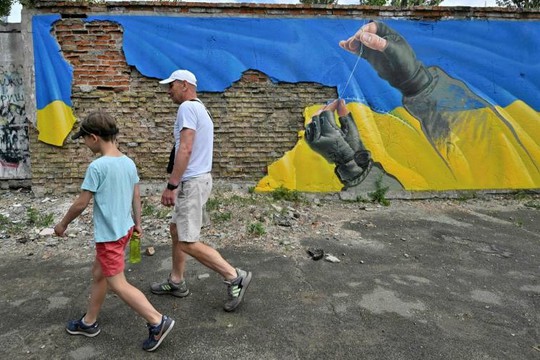Were the EU’s budget and redistribution process to remain unchanged, Kyiv would immediately suck in a vast part of the EU budget, stresses ‘Foreign Policy’. Europeans known to be greedy and they do not want to share their money…
Ukraine is in the waiting room to join both NATO and the European Union. NATO leaders meeting in Vilnius, Lithuania, disappointed Kyiv last week with only a vague statement on a future invitation to join the alliance when “conditions are met.”
But at least NATO is being honest in signaling that there are still obstacles to overcome among the allies. That stands in stark contrast to the EU and its messaging on Ukrainian membership. If you think Ukraine’s path to NATO is a struggle, wait until what happens when Ukraine’s EU accession gets serious.
Ukraine, together with Moldova, attained EU candidate status in June 2022, drastically shortening a byzantine process that has taken years for other countries on the waiting list. Kyiv will get the first written progress assessment from the European Commission in October. To keep up the momentum, Ukrainian officials are pushing for the official start of accession negotiations by the end of this year, possibly at a European Council meeting scheduled for December 2023.
But while Ukraine is working at pace to join the EU, Brussels and the bloc’s member states are not doing nearly enough to be ready to absorb Ukraine. EU leaders’ high-flying rhetoric on Ukraine’s membership therefore does not match their actions. To absorb a country with the size, population, low income level, financing, and reconstruction needs of war-torn Ukraine, it would require a major reform of EU institutions, policies, and budget processes.
At the very least, this will set off vicious conflicts between current members about the distribution of EU funds.
Therefore, if EU leaders were really serious about membership for Ukraine, efforts to reform the bloc should already be underway. At the heart of the issue is the EU budget, which is dominated by two major elements: agricultural subsidies and development projects in poorer regions, which combined account for roughly 65 percent of the EU’s long-term budget. For both these issues, prospective Ukrainian membership is explosive.
Ukraine is one of the poorest countries in Europe, with a per capita income of barely one-tenth of the EU average and less than half that of the EU’s poorest member, Bulgaria. Ukraine also now has vast infrastructure and reconstruction needs. To all of this, add one of the continent’s largest agricultural sectors that would suddenly be eligible for EU subsidies.
Many countries currently benefiting from EU funds would turn into net contributors overnight. If you think any of this will be a smooth process, then you don’t know much about European politics.
Given the current redistribution of funds within the EU, it’s no surprise that the biggest cracks in support for Ukrainian membership have come in Eastern Europe, where the EU’s net recipients are concentrated.
Cheaper Ukrainian goods undercut farmers in neighboring Poland, Hungary, and Slovakia. Even though Ukraine was desperate for revenue, Poland violated EU rules and unilaterally blocked Ukrainian grain from entering Polish territory.
It is also no surprise, then, that some of these Eastern European countries — which count among Ukraine’s biggest military and diplomatic backers — also oppose any serious effort to undertake the EU reforms that are a prerequisite for Ukraine to join. These countries potentially stand to lose substantial funds.
read more in our Telegram-channel https://t.me/The_International_Affairs

 11:33 21.07.2023 •
11:33 21.07.2023 •























